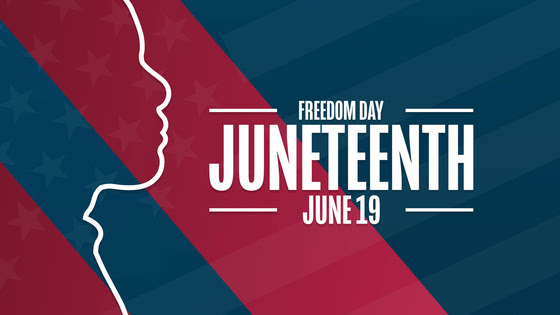
- Details
- By Levi Rickert
Editor's Note: This opinion was first published on June 19, 2021. It has been updated and is being republished today as the nation celebrates the Juneteenth federal holiday.
Opinion. President Joe Biden signed the legislation into law three years ago making Juneteenth a national holiday. Juneteenth, also called Freedom Day, celebrates June 19, 1865, the date the people of Texas were informed slavery was over.
On June 19, 1865, Major General Gordon Granger delivered the message in General Orders, Number 3:
“The people of Texas are informed that, in accordance with a proclamation from the Executive of the United States, all slaves are free. This involves an absolute equality of personal rights and rights of property between former masters and slaves, and the connection heretofore existing between them becomes that between employer and hired labor. The freedmen are advised to remain quietly at their present homes and work for wages. They are informed that they will not be allowed to collect at military posts and that they will not be supported in idleness either there or elsewhere.”
The Order arrived two and half years after President Abraham Lincoln signed the Emancipation Proclamation on Jan. 1, 1863, and two months after Confederate General Robert E. Lee surrendered and ended the Civil War at Appomattox two months earlier.
Even without the modern technology of the Internet, social media, and 24-hour cable news, the lag in time is almost laughable today. The Texas leaders back then really didn’t want the Civil War to be over and certainly did not want slavery to end. Someone could have sent a telegram earlier or played an 1860s version of Paul Revere on horse to tell Texans the news earlier.
Perhaps there is something in Texas that has lingered through decades that makes Texas leaders resistant to good race relations. Two days before President Biden signed the Juneteenth legislation, Texas Governor Greg Abbott signed a controversial bill into state law banning Texas educators from teaching about racism in classrooms.
While the bill does not specifically mention “critical race theory,” it has been labeled an anti-critical race piece of legislation.
Critical race theory is an academic concept that claims racism is a social construct that did not originate through an individual bias or prejudice.
There are some who don’t want teachers to discuss racism in public classrooms.
The Texas bill had compromises inserted by Democratic lawmakers into the law, such as being able to teach about White supremacy. This irritated Abbott, who vowed to have the legislature send him a stronger version for his signature, spelling out that race relations cannot be taught in public schools.
Abbott is among several Republican governors who want to forbid critical race theory taught to students. These Republicans act as if racism did not exist in the United States. This erasure of reality is called whitewashing history.
Because of this big pushback by Republican-controlled legislatures and governors, I was happy that Juneteenth became a federal holiday. It should be noted that Biden’s signature will not solve race relations in the United States.
In recognition of Juneteenth, the National Congress of American Indians issued a statement:
“Today we honor and celebrate Juneteenth as a national holiday. On June 19th, 1865, Union troops arrived in Galveston, Texas with the news the Civil War ended and slaves were now free.
A Civil War continues to this day. It never really ended. Truth be told, we remain sharply divided as a country and, along with our Black brothers and sisters, we have yet to break free from the shackles of centuries of systemic and institutional racism, oppression, and marginalization.
Our day of freedom and emancipation will no doubt come. Until then, we will continue to speak our painful truths, demand justice and equality for all, and rise toward God’s perfect glory for each of us, individually and in this great nation, collectively.
The Juneteenth national holiday is not an end of a long history of poor race relations in the United States, but certainly provides a time of remembrance and should shed a light on how much progress is still needed.
Thayék gde nwéndëmen - We are all related.
More Stories Like This
Tribes Seek Better Data, Real Accountability in MMIP Cases Ahead of Tribal ConsultationWhat Would Dr. King Say About ICE?
In Unity and Commitment
Protecting Our People through Human Trafficking Awareness
It is Time for Animal Behavior to Become Its Own Discipline
Help us defend tribal sovereignty.
At Native News Online, our mission is rooted in telling the stories that strengthen sovereignty and uplift Indigenous voices — not just at year’s end, but every single day.
Because of your generosity last year, we were able to keep our reporters on the ground in tribal communities, at national gatherings and in the halls of Congress — covering the issues that matter most to Indian Country: sovereignty, culture, education, health and economic opportunity.
That support sustained us through a tough year in 2025. Now, as we look to the year ahead, we need your help right now to ensure warrior journalism remains strong — reporting that defends tribal sovereignty, amplifies Native truth, and holds power accountable.
 The stakes couldn't be higher. Your support keeps Native voices heard, Native stories told and Native sovereignty defended.
The stakes couldn't be higher. Your support keeps Native voices heard, Native stories told and Native sovereignty defended.
Stand with Warrior Journalism today.
Levi Rickert (Potawatomi), Editor & Publisher


